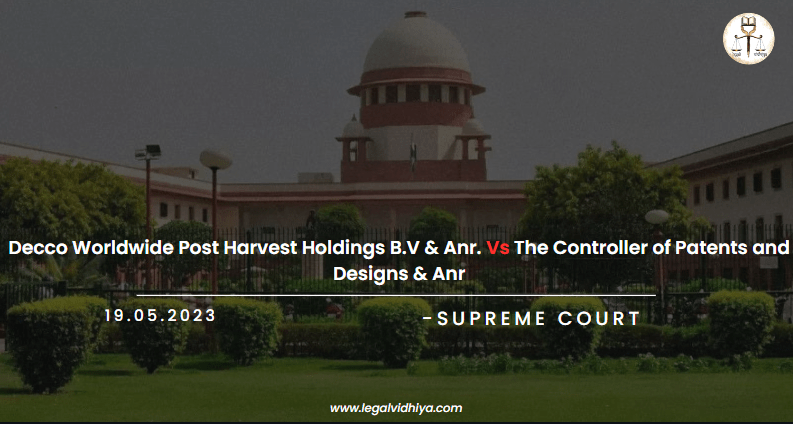
| CITATION | 2023 LiveLaw (Cal) 148 |
| DATE OF JUDGMENT | 19.05.2023 |
| COURT | Supreme Court of India |
| APPELLANT | Decco Worldwide Post Harvest Holdings B.V & Anr. |
| RESPONDENT | The Controller of Patents and Designs & Anr. |
| BENCH | Ravi Krishan Kapur, J.: |
Overview:
The case discussed a patent application for a treatment method using Ortho-phenylphenol to control black sigatoka, a fungicidal infection in banana plants. The invention aims to be cost-effective, environmentally friendly, and improve plant health and yield by reducing chemical fungicides. The rejection reasons included lack of patentability under certain sections, insufficiency of disclosure, and lack of inventive steps. The appellants argued that the objections were baseless, and the Controller failed to provide adequate reasons for the rejection. The Controller’s decision was criticized for not considering prior art data and misinterpreting the invention’s purpose and claims. The appellants also challenged the Controller’s interpretation of the invention’s nature and purpose under different sections of the Act.
Facts:
1.The appellant sought a patent for “A fungicidal treatment for black Sigatoka” an invention using Ortho-phenyphenol to cure black sigatoka, a leaf-spot disease in banana trees caused by the ascomycete fungus.
2.The patent was rejected by the respondent on the grounds of-
a. The invention is not patentable under section 3(h) of the Patents Act, 1970
b. The invention does not disclose the best way of performing the same and suffers from insufficiency of disclosure under section 10(4) of the Act.
c. Lack of obviousness and inventive steps under section 2(1)(ja) of the Act.
3. An appeal was made under section 117A of the Patents Act 1970 assailing the order dated 19 July 2021 passed by the Assistant Controller of Patents and Designs rejecting the Patent Application filed by the appellants dated 7 January 2017.
Issues Raised
1.Is the appeal regarding granting of patent maintainable?
2.Whether a method of treatment of plants to treat fungal diseases would fall within section 3(h) which covers traditional methods of agriculture?
Contentions of appellant
1.The appellants argued that the respondent authorities’ arguments were misconceived and unfounded. The respondent considered the application under section 3(h) of the Act, which pertains to agriculture and horticulture. However, the subject invention was a plant treatment approach that prevents illnesses.
2.The Controller did not disclose reasons for determining that the invention is not patentable under section 3(h) of the Act, even though identical ideas were granted patents by the Controller, as detailed in the petition. The respondents’ submissions do not mention or address this concern.
3.The appellants argue that the Controller’s refusal of the application due to a lack of inventive steps shows a misguided approach to understanding the invention. The reveal or lessons have no relation to black sigatoka.
Contentions of Respondent
1.Counsel representing the respondents said that the use of OPP salt as a fungicide and biocide is widely known to a skilled person, so the subject invention lacked creative steps.
2.He further stated that using a lower dosage of OPP, i.e., a new use of a known drug, cannot be regarded as an invention under Section 3(d) of the Act.
3.Respondents contended the appellant’s claim was contradictory and inconsistent.
Judgment
After hearing the arguments, the court held, “The Controller has misdirected himself in appreciating the invention and comparing them concerning the prior arts without understanding and appreciating the teachings thereof.”
The bench relied on the case of Avery Dennison Corporation vs. Controller of Patents and Designs 2022 which talks about the tests for deciding inventive steps and said that the Controller has ignored the same in deciding the question of inventiveness.
“The subject patent lacked sufficiency of disclosure under section 10(4) of the Act, no adequate opportunity was afforded to the appellants. Significantly, at the hearing before the Controller there was no whisper about any objection concerning the disclosure being insufficient for not fully or particularly disclosing the adjuvants as recited in claims,” the court further added.
Court opined that in issuing the contested ruling, the Controller failed to explain why the subject patent application fell under the category of “agriculture”. In reality, the Controller has not given any arguments as to why a way of treating plants to combat fungal diseases would fall inside section 3(h), which includes traditional practices of agriculture.
Reasons are the foundation of any order passed by any judicial or quasi-judicial authority to provide clarity to the reader and to understand how and why the matter has been proceeded and dealt with by the Authority.” the court added.
Accordingly, the bench set aside the order dated July 19, 2021. The matter was remanded to the authorities for a fresh adjudication on the patentability, emphasizing that the findings were prima facie and not binding on the Controller. The appeal was allowed with specific directions for further consideration.
Analysis
The judgment sets a good precedent as it upholds the principles of natural justice and rightfully provides the appellant with a chance for a fresh examination and hearing for the granting of a patent. The rejection seems arbitrary, as not enough reasons were provided by the respondent. Unreasonableness has no place in the law and leads to gross injustice. There should be proper consideration of facts and reports to grant a patent, and nobody should be denied that legal right without following the proper procedure along with reasonableness.
References
https://indiankanoon.org/doc/96422861/
Disclaimer: The materials provided herein are intended solely for informational purposes. Accessing or using the site or the materials does not establish an attorney-client relationship. The information presented on this site is not to be construed as legal or professional advice, and it should not be relied upon for such purposes or used as a substitute for advice from a licensed attorney in your state. Additionally, the viewpoint presented by the author is of a personal nature.




0 Comments